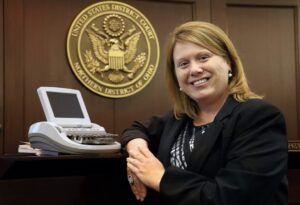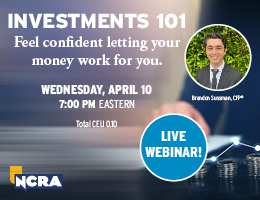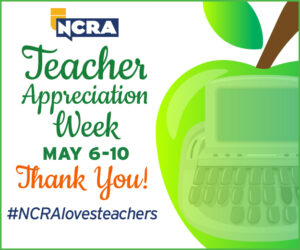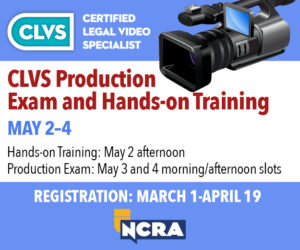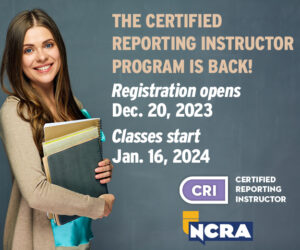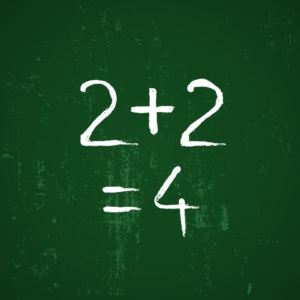By Megan Rogers
“Earning the Registered Diplomate Reporter certification is the crown jewel of our profession, demonstrating competence and experience in all aspects of court reporting,” said Lisa DiMonte, RDR, CMRS, who earned the RDR in October 2016. Less than 5 percent of NCRA members hold the RDR certification, which is NCRA’s highest degree of certification.
The RDR means different things to different people who earn it. For some, the RDR has been a career-long dream. “Having the RDR initials after my name has been something I’ve been aspiring to ever since I joined NCRA,” said Erminia Uviedo, RDR, CRR, who earned the RDR in October 2016. Others see earning the RDR as practicing what they preach. “Our company values court reporters who pursue certifications and commit to continuing education. It is only fair that I expect nothing less of myself,” said DiMonte.
Others use it as a personal benchmark. “What has already been important to me is growth personally and professionally, and improving my skills is how I choose to grow professionally. Certification exams provide a measurable way to do that,” said Kim Xavier, RDR, CRR, CMRS, CRI, who earned the RDR in October 2016.
While the word elite is frequently paired with the RDR, such a lofty sentiment covers up what are very personal rewards for earning the certification. “I live in a small pond,” said Debra Dibble, RDR, CRR, CRC, who passed the RDR in 2012. “I thought I was an average reporter. I may be, but now I have a national standard with which to gauge myself and a measure to say that I have earned a place among the ranks of reporters that I admire and respect on a national level.”
Xavier agrees, adding more benefits that affect the day-to-day on the job. “Having the RDR designation or any other doesn’t necessarily mean I know any more than any other reporter or that I’m any more skilled than anyone else, but it sure does wonders for self-confidence and positive attitude,” she said.
Many of these benefits come in the form of assignments. “I am lucky enough to be included as part of a team of reporters working on an historic case,” said Jim DeCrescenzo, FAPR, RDR, CRR, CLVS, who earned the RDR in May 1995. “Advanced professional designations are part of the price of entry to even be considered to join the team. Having the RDR and CRR opened the door for me to end a great career working with elite reporters on a part of history.”
“Court reporting school was hard! So I want to maximize the benefits of having this amazing skill,” Xaiver said. “Conquering any type of exam in our field is an accomplishment that can’t be taken away.”
Earning the RDR is deceptively simple: It involves one written knowledge test. However, “studying for the test can prove to be a bit tricky because of the broad nature these areas may cover,” said Jeseca Jacobs, RDR, CRR, who earned the RDR in October 2016.
Several reporters used their professional expertise as their preparation for the RDR exam. DeCrescenzo elaborated a bit more on what that meant for him, focusing on the three topics of technology, reporting, and NCRA. “Because I had employees who pushed the technology envelope and developed new products for our clients, I’d been exposed to enough technology-related topics that I felt comfortable with that topic.” His experience working first as an official, then a freelancer, and later a firm owner encouraged him to “begin offering realtime early on.” Finally, he said, “I had been very active on several state and national committees, and I served on the board of my state association for many years, including experience with state and national bylaws and COPE opinions.”
However, NCRA has resources available for reporters aspiring to earn the RDR. “I prepared for the exam by first reviewing the RDR Job Analysis. I almost quit!” said Xavier. “The list of references is enough to change anyone’s mind about taking the exam because there’s really no way a working reporter can read all of those resources from cover to cover and ‘know’ everything. But after taking a good look at the percentages for each domain, I decided to start concentrating on areas where I knew I was weak and began with the references I could easily access on NCRA’s website.”
And Jacobs made her RDR prep a family affair: “I also created flash cards and recruited my husband and my 10-year-old daughter to help me study!”
Uviedo found preparing for the RDR helped her learn even more about the profession. “I learned more about the federal procedures, which I knew nothing about. Those questions really had me thinking hard. But it also made me realize, there’s still a lot of areas I don’t know about. Having an RDR does not mean I get to stop practicing or stop studying.”
Xavier agrees. “The most valuable thing I learned was that I needed to get back to working on personal growth through reading more outside of work, keeping up with technological advances, and paying more attention to what is going on within the profession,” she said.
The one thing that all reporters who have earned the RDR can agree on is that anyone considering going for the certification should just do it. “Education is an express train,” said Dibble. “The longer you stay on, the father you go. The farther you go, the better the scenery.”
Even if the exam feels intimidating, DiMonte has this reassurance: “The worst thing that can happen is you learn what you don’t know. You can always take it again.”
Xavier also recommends that reporters thinking of taking the RDR not wait. “I allowed 15 years to lapse between RMR and RDR, and the steno world changed drastically around me during that time,” she said. “Since this is a knowledge-based exam, the sooner you take it, the less you’ll have to brush up on.”
And maybe Jonas puts it best: “Those three letters will look great behind your name!”
Megan Rogers is NCRA’s Communications Assurance Specialist. She can be reached at mrogers@ncra.org.





